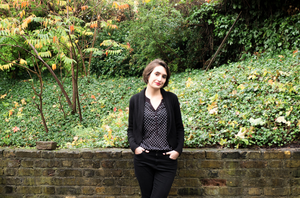Camila is an architect, MSc Building & Urban Design in Development, and PhD Development Planning.
Nationality: Chilean
Year of entry: 2012
Background

She has worked as a practitioner, researcher and teacher in Chile and the UK, with experience of fieldwork, research and teaching in different countries and regions, in issues related to urban development, housing policies, participatory urban design and reconstruction.
She has been editor of EURE Journal, and director of independent projects as Cientodiez Magazine. She is part of the board of Red de Estudios para la Profundización Democrática. Camila was a founding partner of NGO Reconstruye in Chile, developing projects of housing and reconstruction recognised by the Dubai government and UN Habitat award as one of the 100 Best Practices in 2012. Her PhD research was about the challenges of housing policy in reducing urban inequalities and increasing social justice, in the Chilean context.
- Research information
Title:
Housing as Urbanism: The role of Housing Policies in Reducing Urban Inequalities. A study of post 2006 Housing Programmes in Puente Alto, Chile
Keywords: Housing, Inequality, Chile, Policy.
Abstract:This thesis explores the role that housing policies have in reducing inequalities through the production of cities. It emerges from intellectual and political concerns: historically the success of housing policies has been mainly measured by quantitative achievements and has been linked to poverty alleviation. But as poverty becomes a rather multidimensional concept, aspects of inequality become important. Politically, studying housing policies in Chile just in terms of their relationship with poverty could be not just reductionist, but even potentially harmful: for thirty years, Chile has had financially effective housing policies, with poverty reduction and quantitative achievements considered widely successful, and yet levels of inequality remain stagnant and the lives of those who inhabit the products of these policies seem to be full of injustice.To explore these issues, this research first discusses its normative positions regarding the definition of inequalities reduction as the object of a social policy. Then a series of theoretical debates on inequality, space and housing are presented, developing a framework of analysis and proposing a series of conceptual bridges between housing and inequalities, defining ‘housing as urbanism’ and recognising its condition as an economic, social and political device.Empirical work was conducted in Bajos de Mena, a peripheral territory of Santiago, Chile, examining two post-2006 housing programmes that have attempted to decrease urban inequalities, and exploring the extent to which they are actually contributing to tackling the problem of inequality. The main challenges identified are summarised under five themes: institutional order, sectorial agendas, fragmentation and targeting; individual choices vs. collective processes; clientelism and dependency; design as a transformative tool; and the problem of scale, i.e. land policy and citywide processes. Through researching another two urban programmes in the area, existing institutional efforts addressing the challenges identified are explored, leading to the conclusion that urban programmes involve important attempts that need to be in conversation with traditional housing programmes in order to achieve their potential.This thesis aims to contribute to a more comprehensive understanding of the consequences of housing policies in a complex territory. The main argument is that housing policies can play a role in reducing multiple inequalities, but to do so housing must be understood as urbanism, as a multiple-scales process with agency at the economic, social and political level. In discussing this argument, this research also attempts to contribute to the discipline of urbanism. Establishing stronger links between housing and inequality, it seeks to open up new spaces for solidarities within the urban scale, exploring their translation into policy challenges, and the potentials of urbanism to articulate policies at different scales.- Publications and other work
- Review publications at https://ucl.academia.edu/camilacocina:
Selected publications:
Cociña, C. (forthcoming). “Urban Universalism: the debts of housing in the context of targeting policies”, in Boano, C. and Vergara, F. (Eds) Neoliberalism and Urban Development in Latin America: The Case of Santiago. London: Routledge.
Cociña, C. and López-Morales, E. (2017). “Unpacking narratives of social conflict and inclusion in two neighbourhoods of Santiago, Chile”, in Rokem J. and Boano, C. (Eds), Rethinking Planning and Urban Geopolitics in Contested Cities. London: Rutledge, pp.171-188.
Cociña, C. (2016). “Habitar desigualdades: Políticas urbanas y el despliegue de la vida en Bajos de Mena”, Serie documentos de trabajo PNUD– Desigualdad No. 2016/05, Septiembre 2016. PNUD: Santiago.
Cociña, C. (2016). “Ciudades informales: sistemas, normas y el diseño como pregunta”, in Arquitectura Ahora #9.
Cociña, C. and Salazar, D. (2016). Imagining through design: collective learning in Mostar. In DPU summerLab, 2015 series, 36-39.
Cociña, C. and Boano, C. (2013). “Housing and Reconstruction in Chile (2010-2012). Institutional and social transformation in post-disaster context”, International Journal of Architectural Research, 7(3), 57-59 Available at: http://archnet.org/publications/7279
Cociña, C. (2012). Cinco escenas y un relato: profundización democrática en la ciudad de los consensos, Revista Materia No.6, Chile, 64-75.
Cociña, C. (2012). Demoliendo una política de vivienda que consolida la desigualdad [Series of 5 articles] CIPER Chile [Online] Available at http://ciperchile.cl/multimedia/por-que-hemos-construido-guetos-y-lo-seguimos-haciendo/
Cociña, C. (2010). ‘Ideología y reconstrucción 2010: Levantar ciudades y ciudadanías’, in Catálogo XVII Bienal de Arquitectura, Chile: Reconstrucción, pp 52-65.
Cociña, C.; Quintana, F. and Valenzuela, N. (2010). La burbuja que no revienta. Arquitectura pública en Chile. Revista Arquine, N. 53, México, 93-96.
Cociña, C.; Quintana, F. and Valenzuela, N. (Eds, 2009). Agenda Pública: Arquitectura, Ciudad y Desarrollo. Santiago: Cientodiez.
Cociña, C. and Valenzuela, N. (2007). Escóndete Arquitecto, Revista CA, N. 129, Colegio de Arquitectos de Chile, 42-43.
 Close
Close

